 Kurt and Kate Mornings
Kurt and Kate MorningsGetting the Most Out of Scripture Writing – Rebekah Matt
Copying out the Word of God by hand, passage by passage, book by book. Blogger Rebekah Matt writes this: "Even after six years of daily copying, one thing remains the same for me: Scripture writing has transformed my time with God’s Word more than anything else I’ve ever done. Rebekah dropped by to share how writing Scripture can challenge and inspire in new ways, and can help you grow as a Christian!
https://greatandnobletasks.com/2024/09/23/getting-the-most-out-of-scripture-writing/
